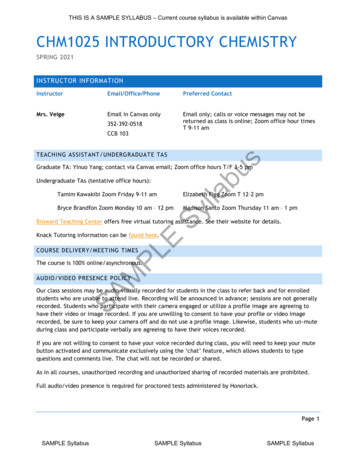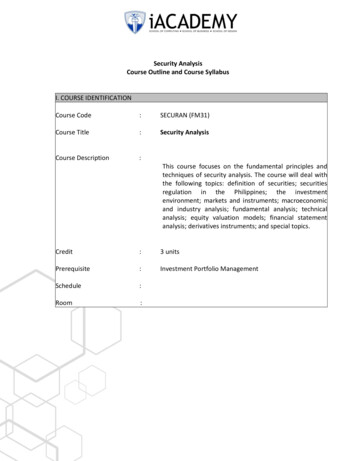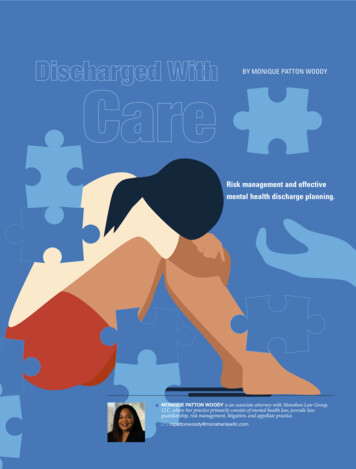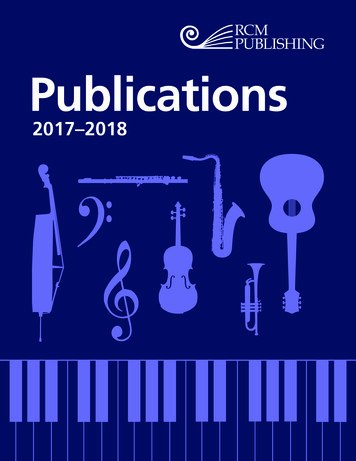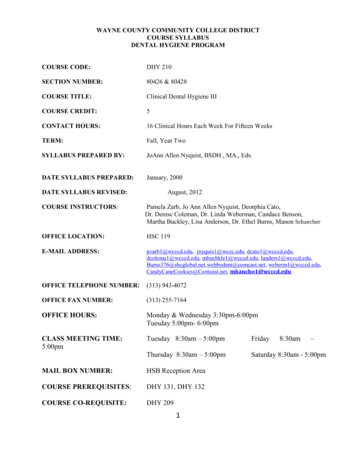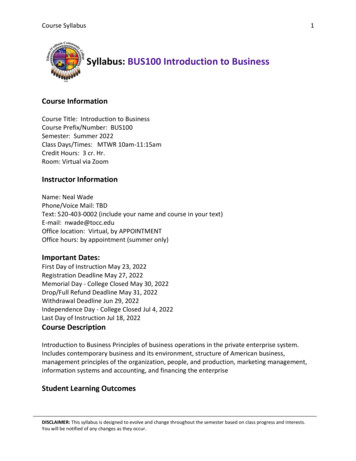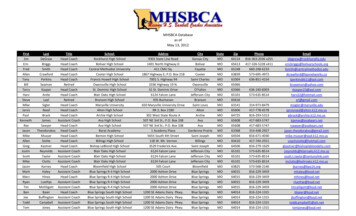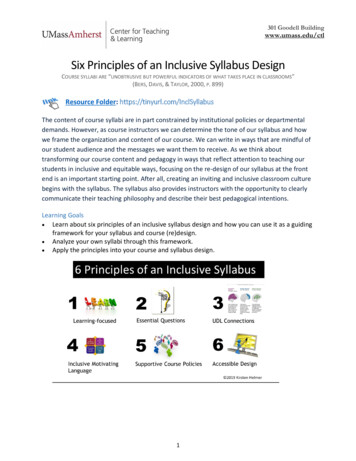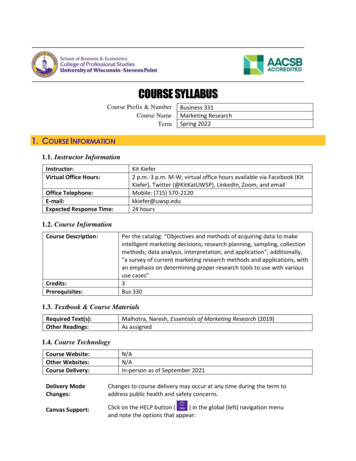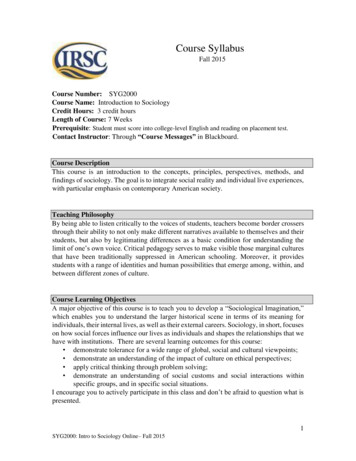
Transcription
Course SyllabusFall 2015Course Number: SYG2000Course Name: Introduction to SociologyCredit Hours: 3 credit hoursLength of Course: 7 WeeksPrerequisite: Student must score into college-level English and reading on placement test.Contact Instructor: Through “Course Messages” in Blackboard.Course DescriptionThis course is an introduction to the concepts, principles, perspectives, methods, andfindings of sociology. The goal is to integrate social reality and individual live experiences,with particular emphasis on contemporary American society.Teaching PhilosophyBy being able to listen critically to the voices of students, teachers become border crossersthrough their ability to not only make different narratives available to themselves and theirstudents, but also by legitimating differences as a basic condition for understanding thelimit of one’s own voice. Critical pedagogy serves to make visible those marginal culturesthat have been traditionally suppressed in American schooling. Moreover, it providesstudents with a range of identities and human possibilities that emerge among, within, andbetween different zones of culture.Course Learning ObjectivesA major objective of this course is to teach you to develop a “Sociological Imagination,”which enables you to understand the larger historical scene in terms of its meaning forindividuals, their internal lives, as well as their external careers. Sociology, in short, focuseson how social forces influence our lives as individuals and shapes the relationships that wehave with institutions. There are several learning outcomes for this course: demonstrate tolerance for a wide range of global, social and cultural viewpoints; demonstrate an understanding of the impact of culture on ethical perspectives; apply critical thinking through problem solving; demonstrate an understanding of social customs and social interactions withinspecific groups, and in specific social situations.I encourage you to actively participate in this class and don’t be afraid to question what ispresented.1SYG2000: Intro to Sociology Online– Fall 2015
Course ResourcesTextbook(s) - (available at IRSC bookstore) Ferris, Kerry & Jill Stein. The Real World.An Introduction to Sociology, 3rd edition. W.W. Norton & Company, Inc., 2012, 2010,2008. ISBN 978-0-393-91217-3 (IRSC Custom Version). Yes, you need the textbook in orderto complete the course successfully.Course RequirementsThis course consists of a series of activities and assessments to assist you in achieving theoutcomes/objectives for the course and instructional units/modules. Each week you willwork on various combinations of assignments, activities, discussions, readings, research,etc.Grades and Grading ScaleAssignment of letter grades is based on the total of points earned (not percentages). Allcourse requirements must be completed before a grade is assigned. At the end of thesemester, your overall grade in the course/letter grade assigned will be based on theGrading Scale below.Grading ScaleA790-711B710-632C631-553D552-474F473-and belowNote: The total points accumulated will NOT be rounded to the next number.Assignments1- Quizzes (10 @ 20pts each)Point Value200ptsOnly the highest ten (10) quiz grades will beincluded in your overall total.2- Discussion Questions (4 @ 10ptseach).40ptsAll 4 disc. grades will be included in youroverall total3- Essays (2 @ 50pts each)100ptsBoth essays will be included in your overalltotal.2SYG2000: Intro to Sociology Online– Fall 2015
4- Exams (3 @ 150pts each)450ptsOnly 3 out of the 4 exam scores will be included inyour overall total. However, the final examCANNOT be dropped. If you do not completethe final exam, your grade will be zero (meaningthat only 2 exam scores--instead of the highest 3-will be included in your overall total).Total790ptsQUIZZES (10 @ 20pts each)There are 12 quizzes to complete (each quiz corresponds to a chapter that will be coveredin the course). Quizzes can be accessed by clicking on the quiz link located in each of themodules. Students are allowed to attempt the quiz twice and the average of those scoreswill be recorded. Quizzes must be completed within 30 minutes and each one has 20questions and is worth a total of 20 points. The two lowest quiz grades will be dropped.Dropping the lowest 2 quiz grades will not have any negative impact on your grade. Rememberthat, for your overall total, you simply need 10 quizzes at 20pts each (see Grading Scale above).Quizzes can be accessed by clicking on the link located in each of the modules. Please checkthe “Schedule of Activities” for quiz dates and deadlines. Quizzes will not be available pasttheir due dates; the only time you can make up missed quizzes is at the end of the semester(Dec 4, 5, 6).DISCUSSION BOARD ASSIGNMENTS (4 @ 10pts each)The primary purpose of the discussion forums is to share your thoughts and ideas onparticular issues and concerns within our society. These discussion forums are especiallyimportant in an online class where face to face interaction is limited. There are four (4)discussion board forums and students are required to complete all of them. Pleasereview the corresponding chapter or other digital resources before offering yourcommentary for the discussion board questions because you are expected to integratesociological insight and critical thinking into each post (See Discussion Board Rubricfor grading criteria). Basically, we expect you to reflect upon the sociological informationyou’ll be learning during this course and use it as you construct responses to the discussionboard questions.The original response to each of these questions must be at least 2 full paragraphs (eachparagraph should have at least 6 to 8 lines, not sentences). Students are also required torespond to at least two of their classmates’ posts. Though there is not a required length,please be thoughtful in your responses to your peers. In other words, a response of “Icompletely agree with you” will not suffice because it needs further explanation.All posts and responses must be completed by the deadlines listed on the Schedule ofActivities. The rationale for the discussion assignments is for students to post a responseand have other students respond to it. If you post a response after the deadline, you defeatthe purpose of having other students respond to your comments. There will be no creditgiven, therefore, for submitting your responses late. Please keep in mind that all discussion3SYG2000: Intro to Sociology Online– Fall 2015
board responses are dated and the time each response was posted is recorded. Eachdiscussion board question is worth a total of 10 points and you will not receive full credituntil all of these steps are followed. Unlike the quizzes, there will be no make up formissed discussions at the end of the semester.EXAMS (3 @ 150 pts each)There will be two (2) at home exams (Exams 1 and 3), and two on-campus proctoredexaminations (Exams 2 and 4). Each exam will consist of 50 multiple-choice questions(3pts each) and, you will be given an hour and fifteen minutes to complete it. Unlike thequizzes, you will be given only one attempt to complete each exam. Once you begin anexam, you will need to complete it within this time frame. The lowest exam grade willbe dropped (remember that, for your overall total, you simply need 3 exams at 150pts each –therefore, dropping the lowest exam score will not have an impact on your overall grade).However, the final exam CANNOT be dropped. If you do not complete the final exam,your grade for the final exam will be zero (meaning that only the highest 2--instead of thehighest 3 exam scores--will be included in your overall total).The on-campus exams must be taken at the testing center nearest to you, i.e., Main (FortPierce), Mueller (Vero Beach), Pruitt (Port St. Lucie), Chastain (Stuart), or Dixon-Hendry(Okeechobee). If you are taking the proctored examination out of state then notify yourinstructor immediately in order to make arrangements. Each exam (whether at home or atthe Testing Center) will be available for two (2) days (see Schedule of Activities). For theproctored examinations, you will be required to bring photo identification such as a driver’slicense. You do not need to notify either myself or the testing center of the time or day youintend to take the exams. All exams (both at home and at the testing center) are to betaken without your notes or your textbook. Please be advised that you will not do wellon the exams if you have not prepared beforehand. Consequently, reading your textbookon a daily basis, and reviewing your notes should be your highest priority. Scores for theonline exams will be available immediately.Make-up tests: Any student who missed an exam (other than Exam 4) must provide theinstructor with a written medical or college excuse in order to take the make-up exam.Unlike the regular test which contains multiple choice questions, the make-up test willconsist of essay format questions. There will be 30 questions (at 5pts each) and youwill have to write an answer for each of the 30 questions without the textbook.If you missed the final test, your grade for that test will be zero, no exceptions (and the zerowill be included into your final grade). You can make up missed quizzes only at the end ofthe semester (December 4, 5, 6). There is no make up for missed discussions.Extra Credit: There will be no extra credit assignments at the end of the semester however,you can earn up to 12 extra credit points by completing the “Chapter Study Questions”. Eachcompleted “Chapter Study Questions” is worth only 1pt and has to be turned in by aspecific date/deadline (see “Important Dates & Deadlines” document for more information).Late extra credit assignments will not be accepted.4SYG2000: Intro to Sociology Online– Fall 2015
WRITING ASSIGNMENTS (2 essays @ 50pts each)In accordance with the policy established by the Department of Social Sciences at IndianRiver State College, this course, like all General Education courses in the Social Sciences,has a writing component. Students are required to complete the two (2) essays below.Topic 1- For the first essay, located in Module 3, students are required to complete thefollowing assignment that focuses on two components of ethnography: Observation andWritten Description. Due date: Sept 24th.Observation: First, for 10-15 minutes, listen to (eavesdrop on) a conversation whoseparticipants you can’t see. They might be sitting behind you on a bus or in a restaurantyou’re close enough to hear them but position yourself so that you can’t see them. Thenfor 10-15 minutes, observe a conversation you can’t hear – one taking place, for example,on the other side of the campus quad. Even though you can’t hear what’s being said, youcan see the interaction as it takes place.Written Description: Second, write an extremely detailed description of each conversation.Describe the participants and the setting, and include your ideas about what you think isgoing on and what you think you know about the participants. Try to describe everythingyou heard or saw to support any conclusions you draw. You need to use informationfrom the Methodology section of your textbook, especially ethnography, to assist inyour responses. (Taken from Ferris, K. & Stein, J. (2012) The Real World: Anintroduction to sociology, 3rd ed., pp. 48-49, W.W. Norton Company: New York, NY).You must follow all of the directions to successfully complete your workshop.Topic 2- For the next essay, which is located in Module 9. Due date: Nov 19th.Choose one of these topics to write about: poverty, racism, sexism, divorce, or crime. Thereare three parts to this essay. The first section of the essay focuses on the individual. In otherwords, what is the role of the individual in causing or perpetuating the particular topic youchose? The second section of your essay involves the role of structure. What role doessocial structure play in causing or perpetuating this problem? The final section of the essayfocuses on social change. How do we bring about social change on an individual andstructural level to lessen this problem? Use the theoretical perspectives of eitherstructural functionalism or conflict theory to help you organize a response. You’llfind more specific information about these topics in their respective book chapters thatinclude: Stratification (income inequality), Race, Gender, Family, and Deviance/Crime(social control).Essay Requirements- You need to have a cover page and a Works Cited pages. Youressay must be a minimum of 3 complete pages NOT including the cover page and theworks cited page. Your essay should be submitted electronically in the digital drop boxlocated in modules 3 and 9. The essay must be double spaced, using either 12 font, andcompleted in Times New Roman. It will be graded on the basis of content, length,grammar, and adherence to the previously mentioned guidelines. I expect students to writeethically. Any information drawn from works published by others must be appropriatelycited within the body of your work, and then referenced as part of a bibliography page in5SYG2000: Intro to Sociology Online– Fall 2015
APA style. Each essay is worth a total of 50 points and must be submitted on or before thedue date. There will be NO credit given for submitting your papers late. If you are havinga difficult time writing the essay, you have the option of turning in your paper aheadof time (not the day before the due date) for me to review it and provide you withfeedback. Consequently, there are no excuses for having a late submission.Withdrawal Deadline: The last day to withdraw from this class with a “W” is Nov. 2nd.Students are responsible for initiating the withdrawal during the designated period. Afterthe Nov. 2nd deadline, Instructor withdrawals will NOT be given for poor academicperformance or poor attendance. If you withdraw online, make sure that you print outthe withdrawal slip or, get a screen shot of it to keep for your records.Student Assistance: If you are experiencing difficulty in the course, your first obligationis to work directly with your instructor to resolve the issue. If you are unable to settle yourconcerns with the assistance of your instructor, you may contact the Department Chair(Dr. Dean Wagstaffe, dwagstaf@irsc.edu), who will assist you or advise you aboutcontacting the Academic Dean (Dr. Bruce Fraser, bfraser@irsc.edu) or VicePresident (Dr. Anthony Iacono, aicono@irsc.edu).Schedule of ActivitiesThe schedule will be located in the Schedule of Activities folder.How to Succeed in this Course Take the SmarterMeasure evaluation if this is your first online course.https://angel.irsc.edu/default.aspFor your username, select the type of degree program from the dropdown menu:Associate” or “Bachelors.”o The PASSWORD is “online” for both degrees. Review“What makes asuccessfulonline /tutorials/pedagogy/StudentProfile.asp)Log in and check for announcements daily. Check your course e-mail regularly. Communicate with your instructor. Create a study schedule so that you don’t fall behind on assignment.Course Guidelines Online CourseThis is an online course and therefore there will not be any face-to-face class sessions. Allassignments and course interactions will utilize Internet technologies.Specific Course PoliciesThe syllabus is a "working document" throughout the course. Students are required to referto it frequently. The syllabus is subject to change at the discretion of the instructor.Academic Dishonesty6SYG2000: Intro to Sociology Online– Fall 2015
To protect the integrity of the grading system and to affirm the importanceof honesty and accountability in the academic community, the Universityimposes strict penalties for academic dishonesty. Academic Dishonestyincludes but is not limited to: Cheating: intentionally using or attempting to use unauthorized materials,information, or study aids in any academic exercise. Fabrication: intentional or unauthorized invention or falsification of anyinformation or citation in an academic exercise. Facilitating academic dishonesty: intentionally or knowingly helping or attemptingto help another to commit an act of academic dishonesty. Plagiarism: intentionally or unintentionally representing the words or ideas ofanother as one’s own in any academic exercise. Infringing on academic rights of others, such as defacement or theft of librarymaterial.PenaltiesA student found responsible for any act of academic dishonesty may be subject to thefollowing maximum penalties: First offense – a grade of “F” will be given for the particularassignment in which the irregularity occurred without any possibility of makeup. A secondoffense will be reported to the appropriate administrator.ADAIndian River State College strives to meet the needs of students with disabilities incompliance with the requirements of Section 504 of the Rehabilitation Act and theAmericans with Disabilities Act. If you require special accommodations please notify yourinstructor within the first two weeks of class.It is my goal to make this course worth your time and effort. Therefore, I will do all withinmy power to ensure that you learn and succeed. If you are concerned with any aspect ofthis course please contact me. You owe it to yourself to talk with me since I can only helpyou if I know there is a problem.Communicating with the InstructorWhen questions arise during the course of this class, please remember to check these two(2) sources for an answer:1. Course syllabus2. Announcements in BlackboardIf you cannot find an answer to your question, post your question to the “Ask the Instructor”discussion board. Feel free to e-mail your instructor, too. The “Ask the Instructor”discussion board can be answered to the benefit of all students by either your fellowstudents who know the answer to your question or the instructor. You are encouraged toanswer questions from other students in the discussion forum when you know the answerto a question in order to help provide timely assistance.7SYG2000: Intro to Sociology Online– Fall 2015
If you have questions of a personal nature such as relating a personal emergency,questioning a grade on an assignment, or something else that needs to be communicatedprivately, please contact the instructor via the course mail. Please allow 24/48 hours forthe instructor to respond.All instructor correspondence should be conducted within your course mail inBlackboard.Attendance/ParticipationPreparation for class means reading the assigned readings and reviewing all informationrequired for that week. Attendance in an online course means logging into the LMS on aregular basis and participating in the all of activities that are posted in the course.Studying and Preparation TimeThe course requires you to spend time preparing and completing assignments. For everycredit hour you should expect to spend at minimum of three (3) hours working on thecourse. Therefore, a 3-credit course would require approximately 9 hours of time, perweek.Examination GuidelinesIRSC requires some proctored examination(s) for fully online classes. Each instructor willindicate their requirements on which exams will be proctored. The proctored exams willbe taken at the IRSC Assessment Centers. The fourth and final exam will be proctored atan assessment center.A quick link to the Assessment Center (Testing) is located in Blackboard in the “Start Here”folder under IRSC Policies & Resources.If you are out of the area, please make arrangements with a local college/school for asupervised assessment. Send the information to the instructor for approval of theassessment arrangements, before class starts.Late or Missed AssignmentsUnless the instructor is notified BEFORE the assignment is due and provides anopportunity for the student to submit his/her assignment late, then late work will NOT beaccepted, and it will be graded as 0.Submitting AssignmentsAll assignments, unless otherwise announced by the instructor, MUST be submitted viaBlackboard. Each assignment will have a designated place to submit the assignment.Instructor FeedbackYour instructor will provide feedback within 7 to 14 days.8SYG2000: Intro to Sociology Online– Fall 2015
Subject to change noticeAll material, assignments, and deadlines are subject to change with prior notice. It is yourresponsibility to stay in touch with your instructor, review the course site regularly, orcommunicate with other students, to adjust as needed if assignments or due dates change.IRSC ResourcesQuick links to the Indian River State College’s resources and policies are listed in the StartHere, IRSC Policies & Resources section of the course including: Catalog Drop/Add Equity MyIRSC – Register forStatementclasses, view grades and Financial Aidfinancial aid awards Incomplete Student Handbook &GradeStudentHandbook IRSC MissionReferenceGuideStatementAdvising Office of Student DisabilitiesTranscriptsStudent Activities Update Personal InformationWithdrawalStudent Success ServicesTesting ServicesPolicyAcademic ResourcesQuick links to the Indian River State College’s Academic Resources are listed in the StartHere, Academic Resource section of the course including: oAcademic CalendarHow to Succeed in this CourseAcademic Support CenterIncomplete GradeAcademic Warning/Netiquette ssment/Examination PolicyStudent ResponsibilityStudying and TimeGraduationoLibrary & Research Paper ResourcesMgmt.o Quick links to the Indian River State College’s Library and Research PaperResources are listed in the Start Here section of the course including:9SYG2000: Intro to Sociology Online– Fall 2015
Library LinkCourse Specific Custom LibraryGuidesAsk the Librarian (24/7)AmericanPsychologicalAssociation TutorialAPA GuidelinesMLA GuidelinesCSE GuidelinesLegal CitationPlagiarism PolicyWriting a ResearchPaper Writing Expectations:It is expected that all students write in a manner representative of students atthis level of their educational journey. Please pay particular attention to theinformation listed below. Essays must be double-spaced, using either 12 fonts, and completed in TimesNew Roman. Your essay will be graded on the basis of content, quantity,grammar, and adherence to the previously mentioned guidelines. Anyinformation drawn from works published by others must be appropriatelycited within the body of your work, and then referenced as part of abibliography page in APA style. Quick links to Library information and reference styles are located underStart Here, then Library & Research Paper Information,Technical RequirementsIRSC Computer Requirements Students must have a reliable computer and Internet connection throughout thecourse. Quick links to the Indian River State College’s Technical Requirementsare listed in the Start Here section of the course including: Blackboard Course NavigationHowtoGetHelpWhat arethetechnology requirements?Recommended Technical Skills If you can’t find your answer within the helpsection, e-mail: virtualclassroom@irsc.edu.Blackboard Learning Management System (LMS) If you need assistance with BLACKBOARD please look at the tutorialson the Log In page of BLACKBOARD. Tutorials are listed on the righthand side. You will find:10SYG2000: Intro to Sociology Online– Fall 2015
Introduction to Blackboard videoStudent Access to ANGEL 101System Requirements and CheckBlackboardFrequently AskedQuestionsBlackboard Help Student Reference GuidesMAC Users InformationBlackboard support websiteBlackboardCollaborateNote: The preferred browser is Firefox.ANGEL LOG IN:USERNAME: Student ID number (no dashes)PASSWORD: IRSC web registration/pay pinTechnical SupportStudents who cannot log into BLACKBOARD or do not see their course inBLACKBOARD should e-mail: virtualclassroom@irsc.eduAccessibility Statement In compliance with the Rehabilitation Act of 1973, Section 504, and the Americanswith Disabilities Act of 1990, professional disability specialists and support staff atthe Student Disability Services (SDS) facilitate a comprehensive range of academicsupport services and accommodations for qualified students with disabilities. IRSC offers many disability resources at on-campus labs. The SDS works withonline students to ensure accessibility. A quick link is located to the SDS in theStart Here folder. Students who wish to request an accommodation for adocumented disability should contact the SDS immediately at 772-462-7782 or772-462-7808.Syllabus DisclaimerThe instructor views the course syllabus as an educational contract between theinstructor and students. Every effort will be made to avoid changing the courseschedule but the possibility exists that unforeseen events will make syllabuschanges necessary. The instructor reserves the right to make changes to the syllabusas deemed necessary. Students will be notified in a timely manner of any syllabuschanges in the course Announcements or course e-mail.11SYG2000: Intro to Sociology Online– Fall 2015
1 SYG2000: Intro to Sociology Online- Fall 2015 Course Syllabus Fall 2015 Course Number: SYG2000 Course Name: Introduction to Sociology Credit Hours: 3 credit hours Length of Course: 7 Weeks Prerequisite: Student must score into college-level English and reading on placement test. Contact Instructor: Through "Course Messages" in Blackboard. Course Description

